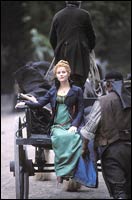ajor American critics disagree over Mira Nair's Vanity Fair. While some of the large circulated newspapers such as the Chicago Tribune, Chicago Sun-Times, Washington Post, San Francisco Chronicle and New York Post have given the film encouraging reviews, pans in The New York Times, Boston Globe and USA Today could hurt the film's bid to secure Golden Globe and Oscar nominations.On the whole, the reviews were far less kind than the ones Nair's Monsoon Wedding received three years ago.
The new film, which was made for $23 million, needs to gross at least $50 million to recover the investment. Solid reviews, and award nominations in key categories such as best picture and best director are absolutely necessary for its box office success.
 | More on rediff.com! |  | |
|
Based on William Makepeace Thackeray's a 19th century novel, the film studies the fortunes of two young women in a rigid and class conscious British society.One of them, Becky Sharp (Reese Witherspoon), is an astute social climber and ultimate survivor. But her success is never smooth and there is always a tragic shadow following her. Many reviewers felt adapting the sprawling book was too big a task for Nair.
Reviewers were also divided over Nair's decision to lend Bollywood touches to the film, which takes place mostly in England.
Thackeray, who was born in Kolkata and who was aware of the impact the new colonies were making on England, does have India peeping into his long novel (in some editions filling 800 pages).
The New York Times review praised some of the performers including Eileen Atkins who plays a hypocritical British aristocrat, but complained that the film was not coherent. It also faulted the Bollywood touches.
'Nair can't resist embellishing the novel's connections to her South Asian roots and slaps on a contemporary multicultural gloss,' Stephen Holden wrote in the Times. 'Two outlandish Bollywood-flavoured production numbers in the second half of the film come off as jarring digressions that seem shoehorned in from another movie. In the first, Ms Witherspoon, flanked by dancers, does a grinding Indian-flavoured hoochy-cooch, worthy of Britney Spears.'
But Kirk Honeycutt, who liked the film despite a few reservations about its jumpy narration, did not find anything wrong in the use of Indian music and dances. 'Traditionalists will no doubt carp about the Bollywood touches,' he wrote in Hollywood Reporter. 'But does anyone really want to see another anemic, literal translation of Thackeray on screen?'
 Honeycutt found the film 'an energetic new take on Thackeray's novel, one flavoured with Indian spices. Nair's Indian touches make for an intriguing, fresh approach. Getting the film out of the art-house ghetto does represent a marketing challenge. The outlook in ancillary markets looks promising.'
Honeycutt found the film 'an energetic new take on Thackeray's novel, one flavoured with Indian spices. Nair's Indian touches make for an intriguing, fresh approach. Getting the film out of the art-house ghetto does represent a marketing challenge. The outlook in ancillary markets looks promising.'
Among those who thought that Nair could not whip up the energy and pathos in the new movie -- unlike in her Monsoon Wedding -- was Ty Burr of the Boston Globe. 'Nair proved she could make a large cast spin in the enchanting Monsoon Wedding,' Burr wrote. 'But she never finds a way to compress her 800-page source into cinematic shape -- you keep coming across lumps in the batter.'
Burr called amplifying the Asian elements that hover in the novel's background was Nair's most original idea. 'But the scenes remain incongruous,' he wrote.
Among the movie's more enthusiastic backers was the respected Roger Ebert of the Chicago Sun-Times, also a widely watched television commentator. He had loved Monsoon Wedding, and warmly embraced Vanity Fair.
'Is the Indian-born Mira Nair a strange choice to adapt what some think is the best English novel of the 19th century?' he asked. 'Not at all. She has an instinctive feel for the comic possibilities of marital alliances, as she showed in her wonderful Monsoon Wedding. And she brings to the movie an awareness of the role India played in the English imagination; in the 19th century, hardly a well-born family lacked relatives serving or living in India, and wasn't it Orwell who said the two nations deserved each other, because they shared the same love of eccentricity?'
Though most reviewers found the British cast impeccable, many praised Reese Witherspoon, one of the highest paid American actresses (fee ranging from $15 million to $18 million) in the role of the ambitious and crafty Becky Sharpe, one of the most intriguing heroines in British literature.
Hollywood observers believe Witherspoon will help the film get on to a solid start. Whether it will have solid feet in the following weeks is anybody's guess.
Hollywood trade publication Variety expects the film to have middle range success for a period film in America, meaning it could gross over $50 million.